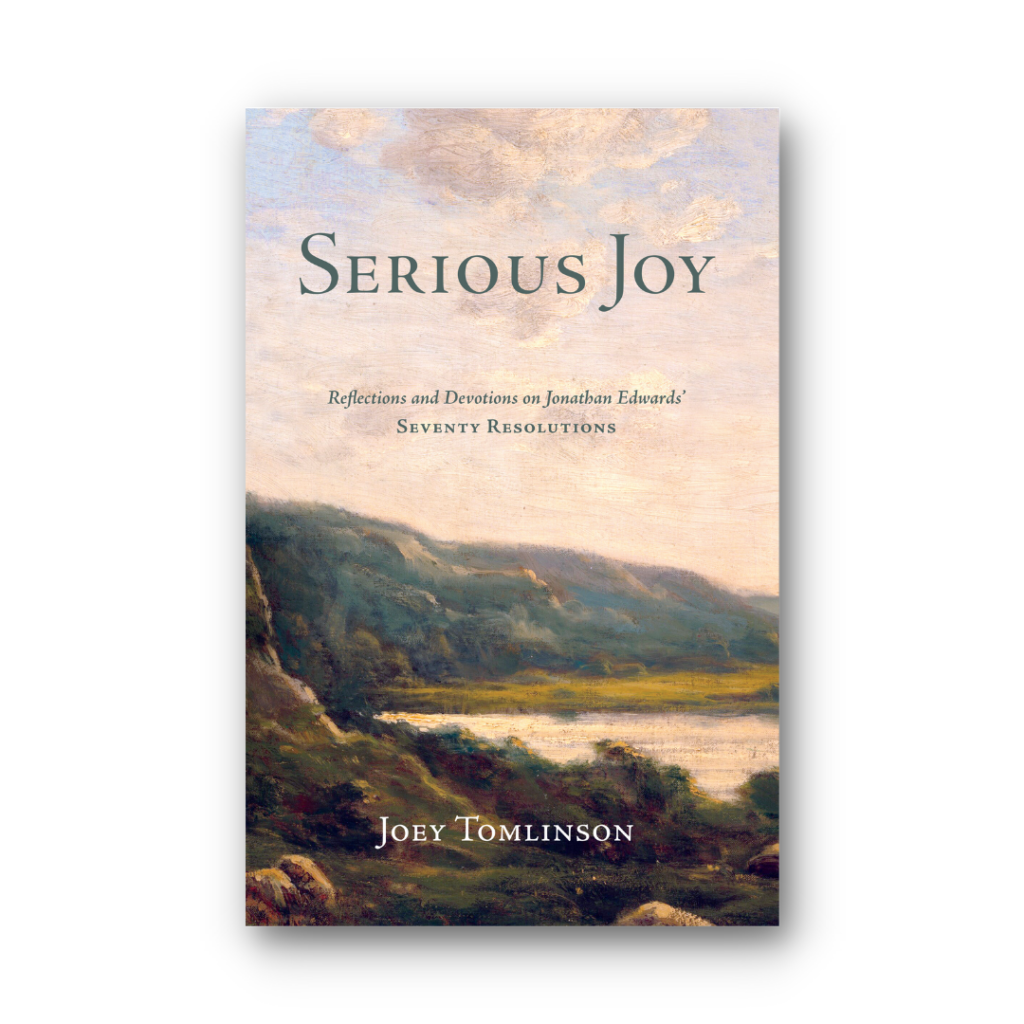What comes to your mind when you think about the word resolution? Is it that there are only a few months left until the end of the year and you’ve yet to keep any of yours? Do you think of physical fitness goals or establishing better eating habits? Maybe you think of financial goals such as getting out of debt. Or how about Bible reading goals like reading the Bible in a year?
Chances are that all of us have made resolutions at some point or another and all of us have failed to keep our resolutions at some point too. But how should we approach our resolutions and how should we think about our failure to keep them?
There is perhaps no better tutor to instruct us on the topic of resolutions than Jonathan Edwards. Before Jonathan Edwards was the Jonathan Edwards we know him to be, he was a 19 year old kid who wrote 70 Resolutions. For Edwards, this was a private document. It was never intended by him to be instructive to others, but there is much that we can glean by considering Edwards’ approach to his own resolutions and his failure (yes you read that right) in keeping them.
How We Approach Resolutions According to Edwards
Being sensible that I am unable to do anything with- out God’s help, I do humbly entreat him by his grace to enable me to keep these Resolutions, so far as they are agreeable to his will, for Christ’s sake. (Jonathan Edwards in his Preamble to his 70 Resolutions)[1]
Edwards wrote a preamble to his 70 Resolutions and maybe that seems a strange thing to include when you think about making resolutions, but this preamble was Edwards’ way of starting off on the right foot. There is much to learn from his inclusion of this preamble, but for our purposes, we will limit our observations to two primary things.
First, we see Edwards’ confession of his utter dependency upon the Lord. It is by grace alone through faith alone in Christ alone that is the foundation of our justification, and it is that same grace on which we are spiritually successful at anything (Ephesians 2:4-10).
Young Edwards knew that he would be “unable to do anything without God’s help.” As Christians, when we seek to make a change in our lives, which is a goal of a resolution, we should at the same time acknowledge the grace that we stand on that makes the change possible.
“But by the grace of God I am what I am: and his grace which was bestowed upon me was not in vain; but I laboured more abundantly than they all: yet not I, but the grace of God which was with me.” (1 Corinthians 15:10 NKJV)
Second, we see Edwards’ desire that his resolutions be agreeable to the will of God. We must live our lives open-handed before the Lord. We can make our resolutions the same way that we can make plans in our lives, but if our plans or resolutions collide with God’s will, we must humbly submit.
“Come now, you who say, “Today or tomorrow we will go to such and such a city, spend a year there, buy and sell, and make a profit”; whereas you do not know what will happen tomorrow. For what is your life? It is even a vapor that appears for a little time and then vanishes away. Instead you ought to say, “If the Lord wills, we shall live and do this or that.” (James 4:13-15 NKJV)
Our resolutions, like the plans we make should always be anchored to “if the Lord wills…”.
If we summarized the way in which Edwards approached his 70 Resolutions, we could say that he approached them in humility. As you approach your own resolutions, consider the grace and will of God in your life as you write them and seek to keep them.
The Failures of Jonathan Edwards
While we can learn how to approach our resolutions by looking to Edwards, we can at the same time learn from his failures. To do this, consider Edwards’ 41st Resolution:
41. Resolved, to ask myself at the end of every day, week, month and year, wherein I could possibly in any respect have done better. Jan. 11, 1723.
First, there is much to commend about this resolution. We tend not to examine ourselves. We don’t sit still long enough to inspect ourselves. In contrast, Edwards sought to set aside times to intentionally and thoughtfully evaluate his character and at this period in his life he used the Resolutions as his rubric (there is no evidence that Edwards maintained a habit of inspecting himself using these 70 Resolutions his whole life). However, there is a danger in using a list of 70 rules to determine your spiritual health and three journal entries from Edwards around the time he penned this particular resolution helps demonstrate this.
Jan. 15, Tuesday, about two or three of clock. I have been all this day decaying…
Jan. 17, Thursday. About three o’clock, overwhelmed with melancholy . . .
Jan. 20, Sabbath Day . . .I find my heart so deceitful, that I am almost discouraged from making any more resolutions.[2]
It is widely known that Edwards struggled with seasons of anxiety and depression, however these journal entries show a particular level of despair. He seems almost paralyzed. I do not think it is a coincidence that Edwards was despairing at the same time he wrote this resolution, but what went wrong exactly?
What young Edwards experienced was the experience we all have this side of eternity—failure. We still wrestle with sin and temptation. We have not received our glorified bodies yet. Therefore, the spiritual progress we make this side of eternity will always be mingled with our sins and short-comings. Yet there is a critical thing we must remember:
We are justified not by our works, but by the works of Another.
“God, who at various times and in various ways spoke in time past to the fathers by the prophets, has in these last days spoken to us by His Son, whom He has appointed heir of all things, through whom also He made the worlds; who being the brightness of His glory and the express image of His person, and upholding all things by the word of His power, when He had by Himself purged our sins, sat down at the right hand of the Majesty on high…” (Hebrews 1:1-3 NKJV)
Jesus our Creator and Sustainer who is the brightness of the glory of God and the express image of his person did everything sufficient for our salvation. His bodily and eternal resurrection and his exaltation is the evidence of that. He by himself purged our sins.
This was one of the significant things about the preamble Edwards wrote. Could it be that Edwards forgot this at times? Absolutely, that is why he wrote the preamble in the first place. But how do I know this for certain? I know this because this is a common experience and struggle east of Eden. Those in the early church had the propensity to forget the good news and so do we. Our Lord knew this would be the case, this is one of the reasons he gave the church two ordinances—baptism and the Lord’s Supper. We need these (along with the Word and prayer) to remember that everything we are, is all of grace.
When we forget that it is in Christ that we live and move and have our being (Acts 17:28), then we default into works righteousness and this is enslaving and always leads us to despair.
The reason Edwards wrote his resolutions was to maximize his enjoyment of God by glorifying God. This is evident by his very first resolution:
1. Resolved, that I will do whatsoever I think to be most to God’s glory, and my own good, profit and pleasure, in the whole of my duration, without any consideration of the time, whether now, or never so many myriads of ages hence. Resolved to do whatever I think to be my duty and most for the good and advantage of mankind in general. Resolved to do this, whatever difficulties I meet with, how many and how great soever[3]
This can be achieved when we remember that we make our resolutions as a people that are positionally right with our Triune God. And as we make our resolutions, we keep in mind that it is the glory of God that makes our resolutions a worthy pursuit. We should make resolutions. But we must remember, our resolutions make lousy saviors.
[1] Works of Jonathan Edwards 16:754.
[2] Works of Jonathan Edwards 16:764-765.
[3] Works of Jonathan Edwards 16:754.

This article is an expansion of teaching from Joey Tomlinson’s book – Serious Joy: Reflections and Devotions on Jonathan Edwards’ Seventy Resolutions. It is now available for order for $14.98 at press.founders.org





















